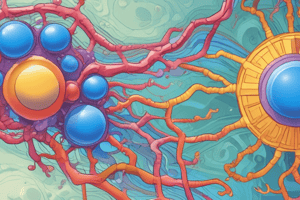Podcast
Questions and Answers
Which of the following is an example of an immunologic type B reaction?
Which of the following is an example of an immunologic type B reaction?
- Malignant hyperpyrexia in anesthesia
- Penicillin allergy (correct)
- Amoxycillin rash in glandular fever
- G6PD deficiency
What characterizes type B reactions?
What characterizes type B reactions?
- Always associated with genetic factors
- Common and predictable
- Less common and less predictable (correct)
- Severe but always mild
Which of the following conditions is associated with G6PD deficiency?
Which of the following conditions is associated with G6PD deficiency?
- Penicillin allergy
- Haemolysis (correct)
- Malignant hyperpyrexia
- Amoxycillin rash
Which of the following is NOT a characteristic of type B reactions?
Which of the following is NOT a characteristic of type B reactions?
What is an example of a disease-related type B reaction?
What is an example of a disease-related type B reaction?
Which of the following type B reactions is idiosyncratic in nature?
Which of the following type B reactions is idiosyncratic in nature?
What type of reaction is an amoxycillin rash in glandular fever categorized as?
What type of reaction is an amoxycillin rash in glandular fever categorized as?
Which of the following best describes a bizarre reaction in a clinical context?
Which of the following best describes a bizarre reaction in a clinical context?
Flashcards
Type B Reaction
Type B Reaction
A less common and less predictable adverse drug reaction that often involves an idiosyncratic response, meaning it's unique to the individual.
Idiosyncratic Reaction
Idiosyncratic Reaction
A drug reaction that is unique to a particular individual due to their specific genetic or physiological makeup.
Penicillin Allergy
Penicillin Allergy
An example of an immunologic type B reaction, characterized by an immune system response to penicillin.
G6PD Deficiency
G6PD Deficiency
Signup and view all the flashcards
Amoxycillin Rash in Glandular Fever
Amoxycillin Rash in Glandular Fever
Signup and view all the flashcards
Malignant Hyperpyrexia
Malignant Hyperpyrexia
Signup and view all the flashcards
Bizarre Reaction
Bizarre Reaction
Signup and view all the flashcards
Predictability of Type B Reactions
Predictability of Type B Reactions
Signup and view all the flashcards
Study Notes
G-Protein Coupled Receptors and Signaling
- Stimulatory G-protein (Gs) activates the enzyme adenyl cyclase, leading to an increase in cyclic AMP (cAMP) levels.
- Elevated cAMP activates specific proteins, particularly protein kinases, which play crucial roles in cellular signaling.
Tyrosine Kinase Linked Receptors
- Receptors have two primary domains:
- An extracellular hormone-binding domain
- An intracellular tyrosine kinase (TK)-binding domain
- These domains are connected by a transmembrane segment.
- Drug binding can lead to irreversible blockage of the receptor, preventing normal function.
First-Pass Metabolism
- First-pass metabolism refers to the process where drugs are metabolized at their site of administration (mainly in the liver) before entering systemic circulation.
- This phenomenon typically occurs following oral administration of medications.
Type B Adverse Drug Reactions
- Type B reactions are less common, unpredictable, and can be severe.
- Examples include:
- Immunologic reactions such as allergies (e.g., penicillin allergy).
- Genetic reactions like hemolysis in G6PD deficiency.
- Disease-related reactions, such as rash from amoxicillin in glandular fever.
- Idiosyncratic reactions, including malignant hyperpyrexia associated with anesthesia.
Studying That Suits You
Use AI to generate personalized quizzes and flashcards to suit your learning preferences.




